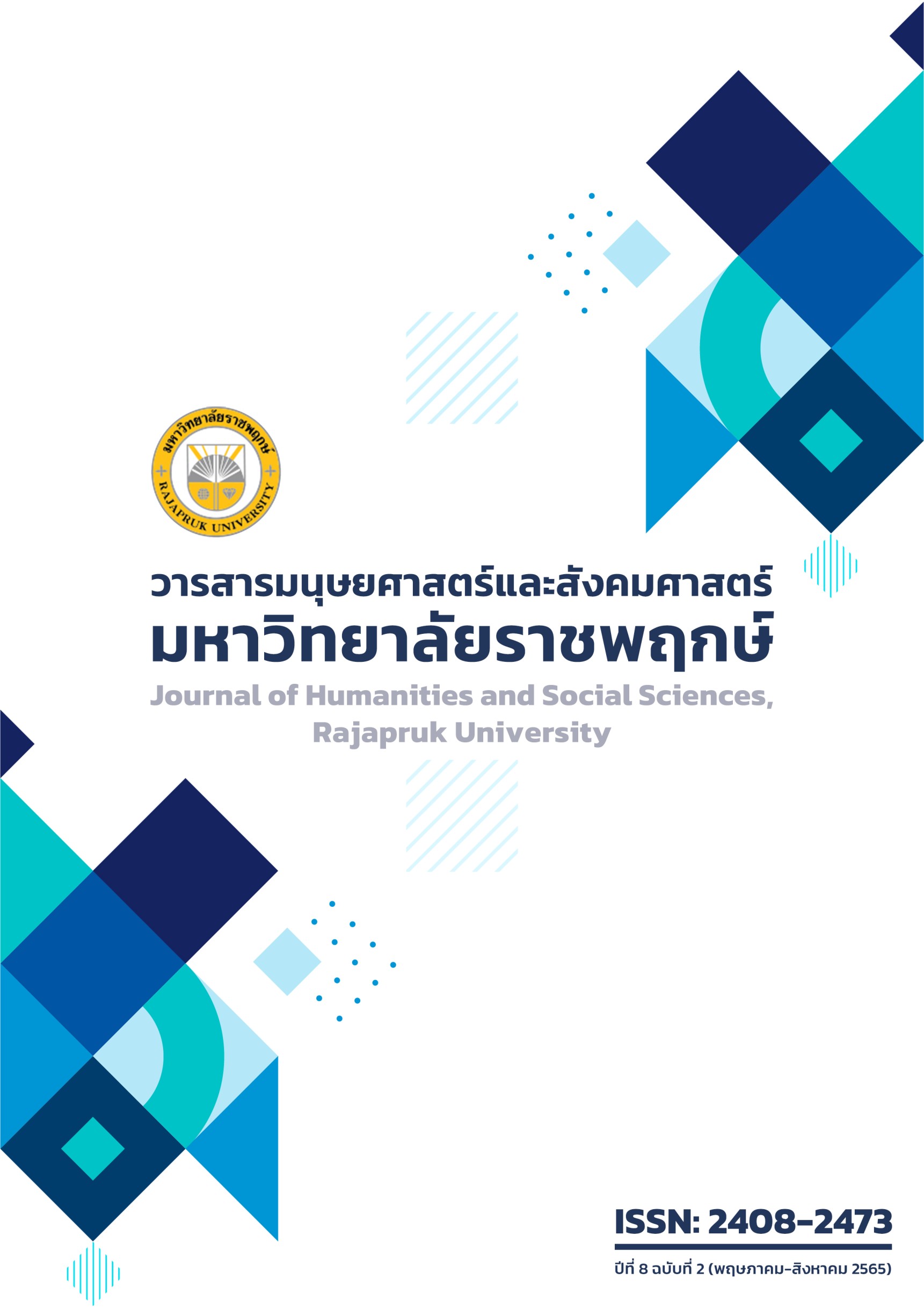The Priority Needs of Development of Secondary School Academic Management Based on the Concept of Building Trust
Main Article Content
Abstract
The objective of this research was to study the priority needs of secondary school management based on the concept of building trust. The population was 2,358 secondary schools under the office of the basic education commission (OBEC). The samples were 342 secondary schools that were selected by applying multi-stage random sampling. The key respondents were 1,595 persons including the school director or deputy director, lead teacher, class teacher, head of the student council, and parent representatives from the parent network. The research instrument was a questionnaire. The data were analyzed by frequency, percentage, means, standard deviation, and PNImodified. The results were as follows. The priority needs of secondary school academic management based on the concept of building trust could be classified with regard to secondary school management. Overall, the highest priority needs index fell on the development of media and learning sources (PNImodified=0.325), the development of the school curriculum (PNImodified=0.324), the measurement and evaluation (PNImodified=0.312), and the teaching management (PNImodified =0.307), respectively. When classified with the concept of building trust, the highest priority needs index fell on the competence-based behavior (PNImodified=0.322), communication-based behavior (PNImodified=0.320), and character-based behavior (PNImodified=0.310), respectively. The recommendation is that the school should conduct the plan of school management based on the concept of building trust; especially, the competence-based behavior, in order to achieve learners receiving trust from others.
Article Details
References
กมล ภู่ประเสริฐ. (2553). หลักการบริหารการศึกษา. พิมพ์ครั้งที่ 3. กรุงเทพฯ: ไทยวัฒนาพานิช.
ชุมศักดิ์ อินทร์รักษ์. (2549). การบริหารงานวิชาการ. พิมพ์ครั้งที่ 4. ปัตตานี: ฝ่ายเทคโนโลยีทางการศึกษา สำนักงานวิทยาบริการ มหาวิทยาลัยสงขลานครินทร์ ปัตตานี.
เทพสุดา เมฆวิลัย. (2563). กลยุทธ์การบริหารวิชาการตามแนวคิดสมรรถนะหลักของนักเรียนโรงเรียนสร้างสรรค์. วิทยานิพนธ์ปริญญาดุษฎีบัณฑิต จุฬาลงกรณ์มหาวิทยาลัย.
ปรียาพร วงศ์อนุตรโรจน์. (2553). การบริหารงานวิชาการ. กรุงเทพฯ: ศูนย์สื่อเสริมกรุงเทพ.
รุ่งรัชดาพร เวหะชาติ. (2550). การบริหารงานวิชาการสถานศึกษาขั้นพื้นฐาน. สงขลา: ศูนย์หนังสือมหาวิทยาลัยทักษิณ.
สมศรี เณรจาที และ วัชรี ชูชาติ. (2560). รูปแบบการบริหารสถานศึกษาเพื่อพัฒนาคุณภาพของผู้เรียนให้มีคุณลักษณะพึงประสงค์ในศตวรรษที่ 21. วารสารบริหารการศึกษา มศว, 14(27): 10-20.
สมาน อัศวภูมิ. (2551). การบริหารการศึกษาสมัยใหม่: แนวคิด ทฤษฎี และการปฏิบัติ พิมพ์ครั้งที่ 3. อุบลราชธานี: อุบลออฟเซต.
สุวิมล ว่องวาณิช. (2550). การวิจัยประเมินความต้องการจำเป็น. พิมพ์ครั้งที่ 2. กรุงเทพฯ: สำนักพิมพ์แห่งจุฬาลงกรณ์มหาวิทยาลัย.
สำนักงานคณะกรรมการการศึกษาขั้นพื้นฐาน. (2550). แนวทางการกระจายอำนาจการบริหารและการจัดการศึกษาให้คณะกรรมการสำนักงานเขตพื้นที่การศึกษาและสถานศึกษา ตามกฎกระทรวง กำหนดหลักเกณฑ์และวิธีการกระจายอำนาจการบริหารจัดการศึกษา พ.ศ.2550. กรุงเทพฯ: ชุมนุมสหกรณ์การเกษตรแห่งประเทศไทย.
สำนักงานคณะกรรมการการศึกษาขั้นพื้นฐาน. (2562). มาตรฐานการปฏิบัติงานโรงเรียนมัธยมศึกษา พ.ศ.2560 (ปรับปรุง พ.ศ.2562). ค้นเมื่อวันที่ 20 พฤษภาคม 2564, จาก https://tinyurl.com/986kvwuv.
สำนักงานเลขาธิการสภาการศึกษา. (2562). มาตรฐานการศึกษาของชาติ พ.ศ.2561. กรุงเทพฯ: สำนักงานเลขาธิการสภาการศึกษา.
เอกชัย กี่สุขพันธ์. (2525). หลักการบริหารการศึกษาทั่วไป. กรุงเทพฯ: ภาควิชาบริหารการศึกษา คณะครุศาสตร์.
Coleman, J. (1988). Social Capital in the Creation of Human Capital. American Journal of Sociology, 94: S95-S120.
Covey, S. M. R. (2018). The Speed of Trust the One Thing Changes Everything. New York: Free Press.
Forsyth, P., Adams, C., and Hoy, W. (2011). Collective Trust: Why Schools Can’t Improve Without it. New York and London: Teachers College Press.
Horsager, D. (2012). The Trust Edge: How Top Leaders Gain Faster Results, Deeper Relationships, and a Strong Bottom. New York: Simon & Schuster, Inc.
Hoy WK, Tarter CJ, Hoy AW. (2006). Academic Optimism of Schools: A Force for Student Achievement. American Educational Research Journal. 43(3): 425-446.
Meier, D. (1995). The Power of Their Ideas: Lessons for America from a Small School in Harlem. Boston: Beacon Press.
OECD (2016). PISA 2015 Results (Volume I). Excellence and Equity in Education. Paris: OECD.
Peterson, C.P. (2019). The 10 Laws of Trust. California: HarperCollins Focus LLC.
Reina, D. and Reina, M. (2015) Trust & betrayal in the workplace: Building effective relationships in your organization. 3rd ed. Oakland: Berret-Koehler.
Romero, L. (2015). Trust, behavior, and high school outcomes. Journal of Educational Administration, 53: 215-236.
Spencer, L.M. and Spencer, S.M. (1993). Competence at Work: Models for Superior Performance. New York: John Wiley & Sons.
Tschannen-Moran, M. (2014). Trust Matters: Leadership for successful schools. 2nd ed. USA: John Wiley & Sons, Inc.
Yamane, T. (1973). Statistics: An Introductory Analysis. 3rd ed. New York: Harper and Row Publications.


